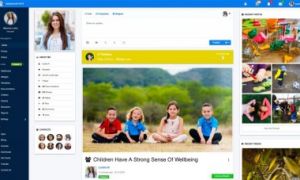Improving parental engagement in early childhood education is crucial for enhancing children's learning and development. The following article provides Strategies for Improving Parent Engagement in Early Childhood Settings, How To Build Strong Relationships With Parents, How To Get Parents Involved In Their Child's Learning In Early Childhood and more.
Strategies for Improving Parent Engagement in Early Childhood Settings
-
Build Strong Relationships: Establish trust and open communication between educators and parents. Regularly update parents on their child's progress and involve them in decision-making processes.
-
Create Welcoming Environments: Make early childhood settings inviting and inclusive for parents. Host events, workshops, and meetings that encourage parents to participate and feel comfortable.
-
Provide Resources and Support: Offer resources and support to help parents engage in their child's learning at home. This can include educational materials, parenting workshops, and guidance on how to support their child's development.
-
Use Technology: Leverage digital tools to keep parents informed and engaged. Use apps, emails, and social media to share updates, photos, and important information about their child's activities and progress.
-
Encourage Volunteer Opportunities: Invite parents to volunteer in the classroom or participate in school activities. This helps them feel more connected to their child's education and the school community.
-
Cultural Sensitivity: Recognize and respect the diverse cultural backgrounds of families. Tailor engagement strategies to meet the unique needs and preferences of different cultural groups.
-
Regular Feedback: Seek regular feedback from parents to understand their needs and concerns. Use this feedback to improve communication and engagement strategies.
How To Build Strong Relationships With Parents
Building strong relationships with parents in early childhood education is essential for creating a supportive and collaborative learning environment for children. Here are some strategies to help you foster these connections:
-
Open Communication: Establish regular and open communication channels with parents. Use emails, newsletters, and parent-teacher conferences to keep them informed about their child's progress and school activities.
-
Welcoming Environment: Create a welcoming and inclusive environment for parents. Invite them to visit the classroom, attend events, and participate in activities.
-
Listening and Understanding: Take the time to listen to parents' concerns, suggestions, and feedback. Show empathy and understanding of their perspectives.
-
Regular Updates: Provide regular updates on their child's development and learning experiences. Share achievements, challenges, and goals through progress reports, photos, and portfolios.
-
Parent Involvement: Encourage parents to get involved in the classroom and school activities. Volunteer opportunities, parent workshops, and family events can strengthen the bond between home and school.
-
Respect and Cultural Sensitivity: Show respect for diverse cultures and backgrounds. Be culturally sensitive and tailor your communication and engagement strategies to meet the needs of all families.
-
Collaborative Approach: Work collaboratively with parents to set goals and develop strategies that support their child's learning and development. Involve them in decision-making processes and value their input.
-
Positive Reinforcement: Highlight and celebrate positive aspects of their child's behavior and achievements. Acknowledge parents' efforts and contributions to their child's education.
-
Feedback and Reflection: Regularly seek feedback from parents to understand their needs and preferences. Reflect on this feedback to improve communication and engagement strategies.
By implementing these strategies, educators can build strong, trusting relationships with parents, leading to a more supportive and enriching learning environment for children.
Creating A Welcoming Environment For Parents In Early Childhood
Creating a welcoming environment for parents in early childhood settings is essential for fostering strong relationships and encouraging parental engagement. Here are some strategies to help achieve this:
-
Warm Greetings: Greet parents warmly every day. A friendly smile and a personal greeting can go a long way in making parents feel valued and welcome.
-
Open Door Policy: Encourage parents to visit the classroom and participate in activities. Let them know they are always welcome to drop in and observe or join in.
-
Comfortable Spaces: Create comfortable and inviting spaces for parents to sit, relax, and chat with teachers. This can include a designated parent corner with seating, coffee, and resources.
-
Clear Communication: Keep parents informed about their child's progress, upcoming events, and any important updates through newsletters, emails, and notice boards.
-
Involvement Opportunities: Offer various ways for parents to get involved, such as volunteering in the classroom, participating in parent committees, or attending workshops and events.
-
Cultural Sensitivity: Recognize and respect the diverse cultural backgrounds of families. Celebrate cultural events and include activities that reflect the cultural diversity of the community.
-
Regular Feedback: Seek regular feedback from parents on how they feel about the environment and what improvements can be made. This shows that their opinions are valued and considered.
-
Family Events: Organize family-friendly events and activities that encourage parents to spend time with their children and interact with other families. This can include picnics, game nights, and cultural celebrations.
-
Visible Leadership: Make sure that school leaders and teachers are visible and accessible to parents. This helps build trust and ensures that parents feel comfortable approaching staff with any concerns or questions.
By implementing these strategies, you can create a welcoming environment that fosters strong relationships between parents, teachers, and children, ultimately benefiting the entire learning community.
How To Get Parents Involved In Their Child's Learning In Early Childhood
Engaging parents in their child's learning in early childhood is essential for fostering a supportive and enriching educational environment. Here are some effective strategies to get parents involved:
-
Regular Communication: Keep parents informed about their child's progress, activities, and upcoming events through newsletters, emails, and parent-teacher conferences. Regular updates help parents feel connected and informed.
-
Parent Workshops: Organize workshops and seminars on topics such as child development, learning strategies, and parenting tips. These sessions can provide valuable insights and encourage active participation.
-
Volunteering Opportunities: Encourage parents to volunteer in the classroom, during field trips, or at school events. This involvement allows them to see firsthand what their children are learning and how they can support them.
-
Family Activities: Plan family-friendly activities and events that allow parents to engage with their children's learning. Examples include family reading nights, art shows, and science fairs.
-
Home Learning Resources: Provide parents with resources and activities that they can do with their children at home. This can include reading lists, educational games, and activity kits.
-
Cultural Celebrations: Celebrate the diverse cultures within the school community by organizing cultural events and encouraging parents to share their traditions and customs. This promotes inclusivity and a sense of belonging.
-
Open Houses and Classroom Visits: Invite parents to visit the classroom and observe their children's learning environment. Open houses and special days allow parents to see their children's progress and interact with teachers.
-
Parent-Teacher Collaboration: Involve parents in the decision-making process by seeking their input on curriculum, policies, and school activities. Collaborative planning fosters a sense of ownership and commitment.
-
Digital Platforms: Use digital tools and platforms to share information, photos, and updates about the child's learning journey. Online forums and apps can facilitate communication and engagement.
-
Positive Reinforcement: Acknowledge and celebrate parents' contributions and involvement. Positive reinforcement encourages continued participation and fosters a supportive community.
By implementing these strategies, educators can create a welcoming and collaborative environment that encourages parents to actively participate in their child's learning and development.
Further Reading
Strategies To Include Family Input In Early Childhood Services
Building Relationships with Families and Co-Workers







 As an Educator in Australia, your pay rate falls under the Children’s Services Award 2010. This award states the minimum amount that an employer can
As an Educator in Australia, your pay rate falls under the Children’s Services Award 2010. This award states the minimum amount that an employer can When working as a qualified Early Childhood Teacher (with a university degree) within a service, your rate of pay will come from the Educational Services
When working as a qualified Early Childhood Teacher (with a university degree) within a service, your rate of pay will come from the Educational Services When working as a Diploma Qualified Educator your pay rate is from the Children's Services Award 2010. This Award states your minimum rate of pay
When working as a Diploma Qualified Educator your pay rate is from the Children's Services Award 2010. This Award states your minimum rate of pay When working as a Cert 3 Qualified Educator, your pay rate is from the Children's Services Award 2010. This Award states your minimum rate of
When working as a Cert 3 Qualified Educator, your pay rate is from the Children's Services Award 2010. This Award states your minimum rate of Educational Leaders play a crucial role in their early childhood service by ensuring that the educational program aligns with best practices and supports the holistic
Educational Leaders play a crucial role in their early childhood service by ensuring that the educational program aligns with best practices and supports the holistic In early childhood education and care, ratios are more than a technicality—they are a frontline safeguard. Every child deserves responsive supervision, emotional connection, and developmental
In early childhood education and care, ratios are more than a technicality—they are a frontline safeguard. Every child deserves responsive supervision, emotional connection, and developmental Here’s a comprehensive Mobile Phone and Smart Watch Policy tailored for early childhood education and care (ECEC) services in Australia, aligned with the latest 2025
Here’s a comprehensive Mobile Phone and Smart Watch Policy tailored for early childhood education and care (ECEC) services in Australia, aligned with the latest 2025 With the new national child safety reforms kicking in on 1 September 2025, early childhood services like yours have a real opportunity to lead the
With the new national child safety reforms kicking in on 1 September 2025, early childhood services like yours have a real opportunity to lead the The Sea of Fish Challenge is a national initiative that invites children, educators, families, and communities to create and display fish artworks as a symbol
The Sea of Fish Challenge is a national initiative that invites children, educators, families, and communities to create and display fish artworks as a symbol Across the early childhood education and care sector, educators are sounding the alarm: current staffing ratios are insufficient to deliver safe, meaningful, and developmentally appropriate
Across the early childhood education and care sector, educators are sounding the alarm: current staffing ratios are insufficient to deliver safe, meaningful, and developmentally appropriate


